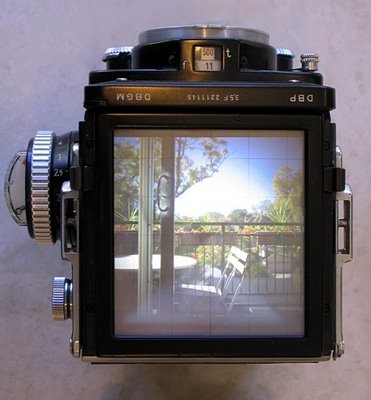The Old Fashioned Way

This is a photo of my cherished Rollieflex 3.5F. It uses 2-1/4 roll film and produces a square image. It's equipped with a 75 mm Zeiss Planar lens, arguably the best lens ever manufactured; crisp, contrasty, perfect in every way. I bought the camera, used, from a small camera shop under the el tracks at
"Do you have any Rollieflex cameras?" I asked, having learned that the old guys in these small camera stores have all kinds of cameras stashed away. The old guy, a short gray and puffy man, with worn pants looked me over. He asked if I was a serious buyer and I assured him that if the camera was what I was looking for, I’d be very serious. He told me to come the next day. When I showed up, he gave me a conspiratorial nod and disappeared into the back room without a word. While he rummaged around, I scrutinized the rows of cameras, lenses and accessories in the glass case. Soon he appeared with a plain carton. He explained that he had to bring it from home; That there wasn’t enough room to keep his entire inventory at the store.
He removed packing materials and carefully un-wrapped the camera. He held the camera and began telling me of its virtues, although he was preaching to the choir. He pointed out that the plastic meter window was intact; not cracked. “Those are the first to get wacked, if you’re not careful.” I was getting anxious and wondered if he would ever let me touch it. After a few minutes he stopped. It was a significant pause. He looked at me solemnly and asked again, “Are you serious about this camera?” I assured him I was. “It’s five hundred bucks.” He leaned forward and looked me in the eye, “Are you still serious?”
To tell you the truth, I nearly choked at the price. It was $200 more than I was prepared to spend. I managed a weak acknowledgement and he handed me the camera. I knew I was sunk the moment I held it. It was built like a Swiss watch. The satin black finish felt like silk. I pretended to be mildly interested and asked a few critical questions before turning to my negotiation strategy.
My negotiation strategy was to appear interested in one or two other cameras. Less expensive cameras. I gave it a try. He answered my questions politely and handed the other cameras to me to examine. After a few minutes he began wrapping the Rollieflex. “Would you take $400 for it?” I ventured. He would not. And continued wrapping.
I came back two days later and looked at several other cameras before bringing up the Rollieflex. I tried haggling again and still could not get him to budge one dime on the price. I came back a third time with the five hundred dollars in my pocket. This time I didn’t bother haggling and simply laid out the greenbacks on the counter. He gave me the camera and a box of film. I was out of there in ten minutes flat.
I remember the first photo I took with that camera, although it was twenty years ago. And I remember, vividly, making the first print of that negative. I was amazed at it’s clarity and contrast. Next, I cranked the head of the enlarger higher and printed a blow-up. I was astonished to find detail that was not visible in the smaller print. I kept looking at that print for days.
The Rollieflex is in the old people's home now (my closet) and has been there, carefully packed away, ever since I got my first digital camera, five years ago. Today, I carry my Canon SD400 in my pocket without giving a second thought that it might get scratched or damaged. Technically, it’s light years ahead of the Rollieflex. Yet, there is something missing. That old camera demanded respect. It was special. I used to hold it carefully, with awe and reverence. Like a cook holds a souffle. Like a father holds his first child. Like a priest holds his chalice.









